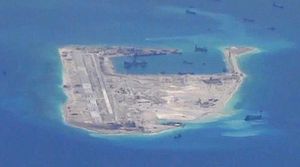Earlier this week, the United States carried out its third freedom of navigation operation (FONOP) near a China-occupied feature in the South China Sea in less than a year. As I discussed, the USS William P. Lawrence, an Arleigh Burke-class destroyer, conducted an innocent passage transit within 12 nautical miles of Fiery Cross Reef, a reef in the Spratly Islands that has been converted into an artificial island featuring a 3,000 meter airstrip. As with the October 2015 and January 2016 FONOPs, China’s reactions to the U.S. Navy’s actions were predictably sour.
The Chinese foreign ministry, using language remarkably similar to what it had said after October’s FONOP in the Spratlys, condemned the U.S. action. “Without permission from the Chinese government, the USS William P. Lawrence destroyer illegally entered waters near the relevant reef of China’s Nansha Islands,” Lu Kang, a spokesperson for the Chinese foreign ministry, noted during a press conference after the FONOP. Lu’s remarks clarified that like the October and January operations, this week’s FONOP was designed to protest China’s prior notification requirement for innocent passage through a territorial sea — a requirement outside of what the United Nations Convention on the Law of the Sea (UNCLOS) provides.
“Relevant department on the Chinese side monitored, followed and issued warnings to the US vessel in accordance with law,” Lu continued. “I must say that what the US warship has done threatened China’s sovereignty and security interests, endangered safety of personnel and facilities on the reef, and jeopardized regional peace and stability. Again, we oppose such move by the US side and will continue to take necessary measures to protect China’s sovereignty and security,” Lu added.
The PLA Daily, the official publication of the People’s Liberation Army, quoting PLA spokesperson Senior Col. Yang Yujun, provided additional detail on China’s tactical reaction to the USS William P. Lawrence‘s innocent passage. China scrambled two Shenyang J-11 air superiority fighters (probably from Woody Island, in the Paracels), one Shaanxi Y-8 transport aircraft (an Airborne Warning and Control System [AWACS] variant) with the People’s Liberation Army-Navy’s (PLAN) aviation force, a Type 052B destroyer (PLAN Guangzhou), a Type 053H3 frigate (PLAN Mianyang), a Type 053H1 frigate (PLAN Linfen).
According to Yang, the three warships reached out to the USS William P. Lawrence, asking it to leave and conveyed warnings. Yujun did not specify the precise nature of the warnings. China has in the past accused U.S. aircraft and ships of entering its “military alert zone,” a term that has no meaning under UNCLOS. “We cannot help but ask how far the U.S. tries to go on the way of pushing forward militarization of the South China Sea and undermining the peace and stability in that region,” Yang said.
It’s notable that Lu, in his remarks, did not directly accuse the U.S. warship of entering Chinese “territorial waters,” a term defined under UNCLOS as extending 12 nautical miles from a coastal state’s baselines. That’s because China hasn’t yet drawn straight baselines around its Spratly claims like it has in the Paracels. Accordingly, for example, after the January 2016 FONOP involving the USS Curtis Wilbur‘s transit near Triton Island, Lu had noted that the “USS Curtis Wilbur violated the Chinese law and entered territorial waters of China’s Xisha Islands without authorization” (emphasis added).
After both the October operation involving the USS Lassen and this week’s FONOP involving the USS William P. Lawrence, the foreign ministry spokesperson for China somewhat ambiguously stated that the U.S. warships “illegally entered waters,” without using more precise language. With a decision imminent in the Philippines’ arbitration against China at the Permanent Court of Arbitration (PCA), China may be forced to clarify its claims in the Spratlys in terms of the categories proscribed under UNCLOS soon enough.

































